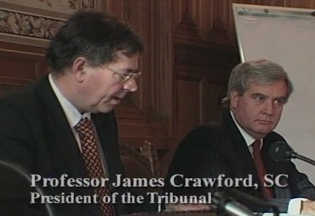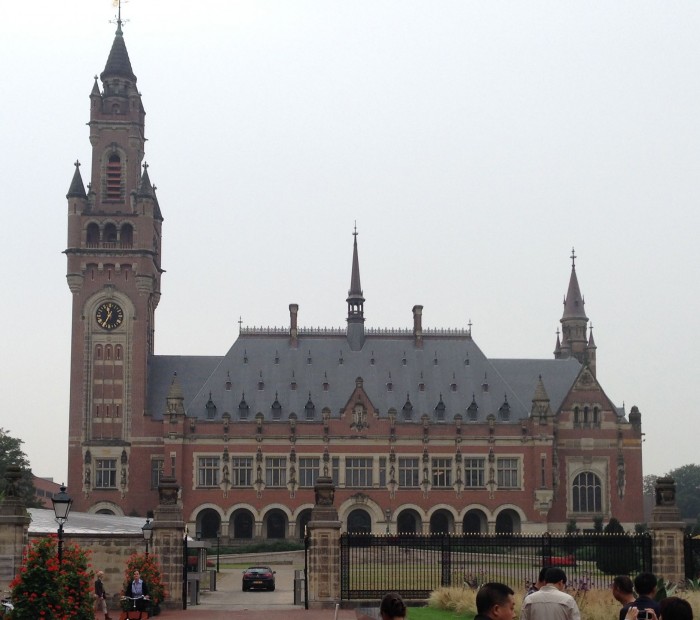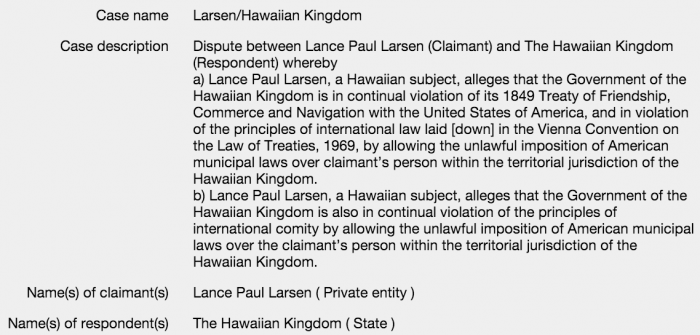 The Permanent Court of Arbitration (PCA) has recently uploaded a Case Repository of current cases and past cases that came before the international court. Listed as one of the past cases that came before the PCA was Lance Larsen v. The Hawaiian Kingdom. The international arbitration began on November 8, 1999 and ended February 5, 2001.
The Permanent Court of Arbitration (PCA) has recently uploaded a Case Repository of current cases and past cases that came before the international court. Listed as one of the past cases that came before the PCA was Lance Larsen v. The Hawaiian Kingdom. The international arbitration began on November 8, 1999 and ended February 5, 2001.
The PCA explicitly recognized the Hawaiian Kingdom as a State and the acting Government as its representative in arbitration proceedings instituted by a Hawaiian subject, Lance Larsen. If the Hawaiian Kingdom did not exist today as a State under international law, and there was no lawful government representing the Hawaiian Kingdom, the case would have never been accepted by the PCA. This is also recognition that the Hawaiian Kingdom was never annexed by the United States, but rather occupied since the Spanish-American War in 1898.
The international court’s explicit recognition of the continued existence of the Hawaiian Kingdom as a State under international law and the acting Government is definitive and removes all doubt of Hawai‘i legal status under international law.
The tribunal concluded in its arbitral award that in order for Lance Larsen to maintain his suit against the acting Government, which he alleged was “in continual violation of its 1849 Treaty of Friendship, Commerce and Navigation with the United States of America, and in violation of the principles of international laid down in the Vienna Convention on the Law of Treaties, 1969, by allowing the unlawful imposition of American municipal laws over claimant’s person within the territorial jurisdiction of the Hawaiian Kingdom,” he needed the participation of the United States as an indispensable third party because it was the United States that allegedly violated his rights and not the Hawaiian Kingdom. His claim was that the Hawaiian Kingdom was negligent for allowing the imposition of American laws in the Kingdom in violation of the treaties.
https://vimeo.com/17007826
The arbitration tribunal was comprised of three highly respected experts in international law, and two the arbitrators, James Crawford and Christopher Greenwood were selected by the United Nations as judges on the ICJ. The United Nations selection is also recognition of the caliber of the arbitrators who served on the Tribunal in the Hawaiian arbitration.
Other international arbitration cases held at the PCA that was similar to the Hawaiian arbitration, being a dispute between a private entity and a State, include, Hulley Enterprises Limited vs. The Russian Federation (2005), Romak S.A. vs. The Republic of Uzbekistan (2006), and TCW, Inc. and Dominican Energy Holdings, L.P. vs. The Dominican Republic (2008).
The PCA was initially limited to arbitration between States, but has since evolved to include private parties against States. A dispute between private parties alone cannot access the PCA without the participation of a State. “Today the PCA provides services for the resolution of disputes involving various combinations of states, state entities, intergovernmental organizations, and private parties.” The United States was not only one of the signatory States to the 1899 Hague Convention, I, that established the international court, but it was also a party to arbitration cases at the PCA, The United States of America v. The United States of Mexico (1902), The United States of America vs. Venezuela (1909), Great Britain vs. The United States of America (1910), and The United States of America vs. The Netherlands (1925). The most recent arbitration at the PCA was The Republic of Ecuador vs. The United States of America (2011).

The PCA is only open to disputes involving international law, which is the reason why a dispute between private parties cannot access the international court. The United Nations Charter created the International Court of Justice (ICJ) in 1945 and it is housed in the Peace Palace together with the PCA. Unlike the PCA, the ICJ limits its access to disputes between States and not disputes between a private entity and the State.
The PCA was established in 1899 when States from around the world met in The Hague, Netherlands, in order to codify the laws and customs of war, which was already accepted as customary international law. It’s first treaty—Hague Convention, I, established a permanent court of arbitration to be housed at The Hague. “With the object of facilitating an immediate recourse to arbitration for international differences, which it has not been possible to settle by diplomacy, the Signatory Powers undertake to organize a permanent Court of Arbitration (Article 20).”


It’s always great to hear positive news. So what does this mean? Does anyone know what happens next if anything at all?
I find this interesting, ” Unlike the PCA, the ICJ limits its access to disputes between States and not disputes between a private entity and the State.”
We just got to be patient, Thomas. I know. I want this occupation to start ending too. With the way things are going, it eventually is going to be only a matter of time. This information is spreading and is not being contradicted. The United States and the State of Hawaii government knows they cannot go on like this forever.
Iolani – it is now 2018. What if anything is transpiring?
Positive rendered judgment/opinion from PCA mean Maoli Kanaka contention to independence Nation state is valid; would/could/should continue generating legal/official/authentic dynamics/activities by Maoli Kanaka to invoke U.S. summon (part)(re)presentation in the ICJ as recourse to/with Hawaii’s international differences … contrary to any sentiment “it isn’t international business”. Take it to the max/zenith/apex in demanding DOI to decease with their posturing is my onipa’a advice and hope for kanaka to maintain, in all ‘aina disputes.
Thus, the Republic of Hawaii was ipso facto, by name only created by the U.S. and acknowledged by it in 1894 while still under U.S. beligerent occupation and renaming the Hawaiian Kingdom’s government under its control; violating the Rules of war and the laws of occupation and neutrality. The fact that Kingdom of Hawaii subjects never recognized the ipso facto U.S.-backed Republic of Hawaii and still maintained the Kingdom of Hawaii; their nation-state still continues today while both country and its government (U.S. renamed it as the State of Hawaii) and its citizens exist albeit under thehlawless U.S. belligerent occupation. Hawaiian Kingdom citizens still object and protest against the United States international violations of their country.
There is solidarity in reasoning and harping on the same arguments. The more people are aware of the facts and use them; the stronger the voice of the people which will eventually be heard. Our leading activists then can continue to take it to the international body. Send the message throughout the world on every opportunity.
I reject the unlawful Body Named: The United States of America as a true and governing entity over my Lawful and existing Government named; Kingdom of Hawaii I was born a lawful citizen of the Kingdom of Hawaii in 1954 of April 12 in the Territory of Hawaii I have never become an American citizen nor was I ever sworn in to the American Government It’s Flag nor America’s governing law’s. I wish to insert my right’s under all governing laws through out the world and International laws and my rights under God’s laws to exist as a living and Sovereign person and has the right to live under the existing rules and laws under my existing Hawaiian Kingdom I also here-by declare that the United States Cease and Decease their continuing and Illegal occupation of my Kingdom of Hawaii. I also declare that the United States and all of it’s Un-lawful laws and activities are in direct violation of International Laws. The Law of God of which I have the right to exist as a Sovereign person, The United States own Laws and Their Constitutional Laws, and my Hawaiian Kingdom’s Law’s and our Constitutional Laws. Therefore I also Reserve The right to have a voice, and to state my opinion’s and my concern’s when ever you Sir. meet to make any decision’s for or against my Country and or My Hawaiian Kingdom Mahalo! Mr.Solomon Andronicus Kaleiopu Jr.
I believe the value of Dr. Sai’s work is in continuing to bring to the attention of the world that the Kingdom of Hawai’i still exists.
However, I do not agree with his conclusion, stated in the title, “International Court Recognizes The Hawaiian Kingdom as a State”. Where in any of the documents, and in the “Award” document, is it stated that “The Kingdom of Hawai’i is recognized as a valid party”?
From what I read, The PCA did NOT recognize the Hawaiian Kingdom as a State, and simply said there was no dispute capable of submission, and it needed to include the third party of the USA. If anyone can find that in the documents presented by the PCA, feel free to share.
Read the PCA award of the above case. The HK is named as a party to the case. Read page 19 at ” 7.4. A perusal of the material discloses that in the nineteenth century the Hawaiian Kingdom existed as an independent State recognized as such by the United States of America, the United Kingdom and various other States, including by exchanges of diplomatic or consular representatives and the conclusion of treaties. On 6 July 1898, Joint Resolution No. 55 was passed by the United States House of Representatives and Senate to provide for the annexation of the Hawaiian Islands to the United States. This followed an uncompleted process of annexation attempted during the administration of President Grover Cleveland in 1893.”
Once an independent state is recognized it posses the presumption of continuity until that presumption is rebutted in accordance with international law. This means the U.S. has the burden of providing a “Treaty of Annexation” pursuant to international law proving they extinguished the HK and incorporated it into the independent state of the United States. There is no such Treaty so the presumption is that the HK exists.
If you click onto the Lance Larsen vs. Hawaiian Kingdom link it identifies the Claimant as Lance Paul Larsen (Private entity) and the respondent as the Hawaiian Kingdom (state).
Hawaiian Kingdom (State)
The capitalization on the “State” is the important item. It distinguishes Hawaii from being identified as a (lower case) “state of” US; recognizing it as it’s own Nation. It says it right where Kekoa directs the audience.
kekoa – I think one key aspect of 7.4 is the terminology used… i.e. HK “existed”… not HK “exists” the distinction being one of a past condition not of an enduring condition.
Thoughts?
Think about it; it all makes sense!
mahalo so much for clarifying “state” vs. “State”
EAucation 101
Hawaiian Kingdom State to the
50th fake state
End the Occupation NOW
A’e ho’i! End it now! I don’t want my country back, I want it back under legitimate rule! Hawaii is still its own country; the puppet regime just needs to be dissolve and the H.K. Government needs to reassume its power. The Executive Agreements still exist!
I am confused. I read the entire document and I do not see where the Tribunal actually recognized Hawai’i as an independent state. And do not get me wrong, I want more than anything for it to be true!
But I am using the LHK Award document as a resource for a paper I am writing, in support of Hawaiian independence. So please, I am completely open to you directing me to the place in the document that I may have missed that shows what you are saying. I really want it to be true.
But the audience my paper addresses are people outside of Hawaii that are not aware of the illegal annexation. They assume like many others, that it was just what counties did in that time. We know that is not the case, but others do not.
And with the way things are going in Washington right now, we need to be educating as many people as we can about this issue.
This is my goal, not just to finish a class assignment, but to use that assignment as well as other assignments as resources for informational meetings to tell people in the US about how critical this issue is now!
Mahalo for your dedicated service and kokua in this manner. Aloha
File UCC 9 termination statements with state of Hawaii citing illegal takeover? Anyone tried that yet ?
Seen it before and it’s another misdirection to take the focus off ending the occupation. No time for games. The UCC was never passed as positive law in the Hawaiian Kingdom. You want to gain control over an entity that the U.S. created? That just validates that it’s still their game and their rules. Let’s just get rid of the whole game and the players.
Mele Lani – did you publish your paper? if so would it be possible to provide a link to it?
Mahalo!
The text below is taken from the 1900 Congressional Debate Record on the Organic Act to establish a government for the ‘Territory of Hawaii,’ and I wonder if this PCA case touched on what Senator Allen was getting, here:
Mr. ALLEN. I utterly repudiate the power of Congress to annex the Hawaiian Islands by a joint resolution such as passed the Senate. It is ipso facto null and void.
Mr. SPOONER. I had my questions about that. I have my conviction about it now.
Mr. ALLEN. My constitutional conviction is clear.
Mr. SPOONER. But that is a political question, not subject to review by the courts.
Mr. ALLEN. I beg the Senator’s pardon.
Mr. SPOONER. . I grant it.
Mr. ALLEN. The Senator ought to. . It could be made the subject of review by the courts. It could be very easily made the subject of review by quo warranto or some other process.
Mr. SPOONER. Quo warranto? How?
Mr. ALLEN. I am not going into the details of it. Suppose a citizen of the Hawaiian Islands should be arrested. Could not that be raised by a question of habeas corpus?
Mr. SPOONER. Of course not.
Mr. ALLEN. Of course not? Of course it could. But I want to say to the Senator—he seems to be delegated to take charge of me on almost all occasions——
Mr. SPOONER. I beg the Senator’s pardon. That is not true. I decline that responsibility.
Mr. ALLEN. It will take lots of the Senator’s time if he discharges his duty fully. But what I want to say, and then I will quit, is that I have no respect whatever for the judgment of the Senate in passing a joint resolution to annex the Hawaiian Islands, and I discharge my full constitutional duty, in the light of my responsibility to God and to my country, when I vote against every measure of this kind.
Mr. HOAR. I rise merely to ask the Senator from Colorado [Mr. TELLER] a question. I do not wish to take the floor.
Mr. TELLER. I will wait until the Senator from Massachusetts gets through.
Mr. HOAR. I thought the Senator was through.
Mr., SPOONER. I yield to the Senator from Massachusetts.
Mr. HOAR. I beg pardon. I thought the Senator had concluded. I merely wish to ask a question.
Mr. SPOONER. The Hawaiian Islands were annexed to the United States by a joint resolution passed by Congress. I reassert, although my distinguished legal friend the Senator from Nebraska is absent, that that was a political question and it will never be reviewed by the Supreme Court or any other judicial tribunal. That is too well settled to admit of any doubt except perhaps in Nebraska.
***
(If there is any way to get a court of competent jurisdiction to recognize Hawaii’s independence, I think the above might hold a clue.)
They have proven they will never recognize Hawaii’s independence. Like above discussion they will continue to use the political question tactic to circumvent the issue. It is a circular maze to trap you. The fact of the matter is that the U.S. courts are not the final authority to make the determination regarding Hawaii’s status or it’s path to de-occupation. Once you realize this fact then you won’t get caught in their trap.